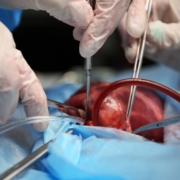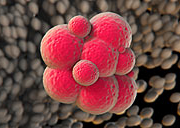Cloning Neanderthal babies: what we really need to be concerned about

Could it really be possible to create a cloned Neanderthal baby? A Harvard Professor of Genetics, who helped initiate the Human Genome Project, seems to think so, and his views have been spread around media outlets worldwide. Of course, just because Der Spiegel and the Daily Mail report it, does not mean that there is any mileage in his suggestion.
Source of the Neanderthal story is George Church, Professor at the Harvard Medical School Department of Genetics and author of ‘Regenesis: How Synthetic Biology Will Reinvent Nature and Ourselves’. Church was interviewed this week by the German news magazine Der Spiegel. In the interview Church said he thought it would be possible, and indeed desirable, one day to clone and grow a Neanderthal baby! This came to our attention when picked up by the Daily Mail who asked for our reaction.
Sometimes these kinds of radical and extreme proposals, particularly when advocated by respected scientists, can serve a secondary, more subtle, purpose.
The original proposal – in this case cloning a Neanderthal baby – will start people thinking that, perhaps, what is now considered to be pure science fiction may possibly, after all, become science fact. But, more importantly, when the idea of cloning a Neanderthal is compared with cloning a human person now, suddenly cloning a human seems less extreme than it once did. Bit by bit we become softened so that what was once considered utterly beyond the pale is now not nearly so bad compared to the latest and most extreme suggestion. This is a common, and effective, tactic: raise the bar so high that anything lower seems so much more reasonable.
Could this proposal be at all possible? Church says that he is currently developing technology in his lab that can be used to make human cells similar to those of Neanderthals. Eventually, he says, an ‘adventurous female human’ will need to be found as a surrogate mother for the first Neanderthal baby.
Here is an extract from the interview:
SPIEGEL: Mr. Church, you predict that it will soon be possible to clone Neanderthals. What do you mean by ‘soon’? Will you witness the birth of a Neanderthal baby in your lifetime?
Church: That depends on a hell of a lot of things, but I think so. The reason I would consider it a possibility is that a bunch of technologies are developing faster than ever before. In particular, reading and writing DNA is now about a million times faster than seven or eight years ago. Another technology that the de-extinction of a Neanderthal would require is human cloning. We can clone all kinds of mammals, so it’s very likely that we could clone a human. Why shouldn’t we be able to do so?
SPIEGEL: Perhaps because it is banned?
Church: That may be true in Germany, but it’s not banned all over the world. And laws can change, by the way.
SPIEGEL: Would cloning a Neanderthal be a desirable thing to do?
Church: Well, that’s another thing. I tend to decide on what is desirable based on societal consensus. My role is to determine what’s technologically feasible. All I can do is reduce the risk and increase the benefits.
Later in the interview Church is challenged about the feasibility of his proposal:
SPIEGEL: It all sounds so easy and straightforward. Aren’t biological processes far more complicated than you would like to lead us to believe?
Church: Yes, biology is complicated, but it’s actually simpler than most other technologies we are dealing with. The reason is that we have received a great gift that biology has given to us. We can just take a little bit of DNA and stick it into a human stem cell, and all the rest of it is self-assembled. It just happens. It’s as if a master engineer parked a spacecraft in our back yard with not so many manuals, but lots of goodies in it that are kind of self-explanatory. You pick up something and you pretty much know what it does after a little study.
SPIEGEL: Do you understand that there will be people who feel rather uncomfortable with the notion of changing the genome of the human species?
Church: I think the definition of species is about to change anyway. So far, the definition of different species has been that they can’t exchange DNA. But more and more, this species barrier is falling. Humans will probably share genes with all sorts of organisms.
The Der Spiegel interview thus closes ominously with this assertion, that while mingling human DNA with that of other species has always been off-limits, ‘this species barrier is falling’.
As I said in a quote to the Daily Mail: ‘It is hard to know where to start with the ethical and safety concerns, if this proposal were even possible to carry out (which is highly unlikely).’
The fact that Church has also been involved in the establishing of around two dozen biotech firms suggests a personal agenda here too. I concluded my quote to the Mail with the following point (which they did not print): ‘It is hard to see any benefit from this extreme proposal other than stirring up publicity to generate some funding for his own research.’
Quite apart from the safety issues, here are just a few of the bigger ethical concerns:
- It would involve cloning, not just Neanderthals but undoubtedly humans as well;
- It would require a surrogate woman to carry a Neanderthal baby, and probably not just one;
- It would involve inheritable germ line genetic manipulation;
- It would involve embryo research on a huge scale;
- It would lead to mixing of animal and human genes and crossing species barriers;
- It would lead to a complete re-defining of humans.
To Church, the human body is an object to be investigated and played with, to do with as he wills. It is a commodity to be manipulated. He believes in the right of individuals to engineer and re-design their own humanity and destiny.
A recent CMF File says this of people holding such beliefs: ‘Transhumanists reject any intrinsic value of the human form, advocating that humans should be free to change themselves however they desire. They argue that modification of one’s genetic make-up, neurological composition, prosthetic augmentation and other cybernetic modifications should be encouraged, limited only by technology and one’s own discretion. ‘”Human” – the very word is synonymous with suffering and failure…humanity is a disease state from which to be cured!’
When we assume that the body is manipulable according to individual preferences, then real ethical concerns arise. The abuse of technology threatens inherent human dignity and challenges the equal moral status of all human beings. The cost of such ‘progress’ would be high to existing and future members of the human race.
CS Lewis rightly warned many years ago that: ‘… Man’s power over Nature turns out to be a power by some men over other men’.






Leave a Reply
Want to join the discussion?Feel free to contribute!